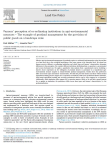Häfner K., Piorr A. (2021). Farmers' perception of co-ordinating institutions in agri-environmental measures. The example of peatland management for the provision of public goods on a landscape scale. Land Use Policy, 01/08/2021, vol. 107, p. 1-8.
https://doi.org/10.1016/j.landusepol.2020.104947
https://doi.org/10.1016/j.landusepol.2020.104947
| Titre : | Farmers' perception of co-ordinating institutions in agri-environmental measures. The example of peatland management for the provision of public goods on a landscape scale (2021) |
| Auteurs : | K. Häfner ; A. Piorr |
| Type de document : | Article |
| Dans : | Land Use Policy (vol. 107, August 2021) |
| Article en page(s) : | p. 1-8 |
| Langues : | Anglais |
| Langues du résumé : | Anglais |
| Catégories : |
Catégories principales 07 - ENVIRONNEMENT ; 7.4 - Ressources Naturelles : Paysage, Biodiversité, Patrimoine naturelThésaurus IAMM AIDE AGRIENVIRONNEMENTALE ; BIEN PUBLIC ; COORDINATION ; AGRICULTEUR ; GESTION DE L'ENVIRONNEMENT ; COOPERATION |
| Résumé : | Effective agri-environmental management of peatlands requires co-ordinated implementation action beyond that on a farm level due to the ecological functioning of the water system at the watershed level. We assess how farmers perceive different co-ordinating institutions and which farm and farmers' characteristics determine differences in the perception. We consider different institutions facilitating farm co-operation: a governmental and a more horizontal one. We apply a quantitative data analysis from a questionnaire survey including a discrete choice experiment on the willingness of peatland farmers to participate in a hypothetical agri-environmental measure targeted at climate-friendly peatland management. Results show that preferences differ across farm types and farmers' characteristics. We find that part-time farmers and those without formal agricultural training perceive support for co-operation as beneficial, while more professional farmers (full-time, with formal agricultural training and receiving professional advice) tend to reject support for co-operation. Additionally, which institution offers support for co-operation matters. While we do not find a general pattern for or against an institution, the preferences differ across farm types and farmers' characteristics, i.e. the professionalization. |
| Cote : | Réservé lecteur CIHEAM |
| URL / DOI : | https://doi.org/10.1016/j.landusepol.2020.104947 |







